This Week in Anime
Do the Emotional Beats of Drifting Home Hit Hard?
by Nicholas Dupree & Monique Thomas,
The newest film from Studio Colorido sends a group of sixth-graders out to sea to deal with their burgeoning adolescent feelings. Can a film about a drifting apartment complex bring its big emotions home?
This movie is streaming on Netflix
Disclaimer: The views and opinions expressed by the participants in this chatlog are not the views of Anime News Network.
Spoiler Warning for discussion of the series ahead.
 @Lossthief
@Lossthief
|
 @BeeDubsProwl
@BeeDubsProwl
|
 @NickyEnchilada
@NickyEnchilada
|
 @vestenet
@vestenet
|
Nick
Nicky, oftentimes the best anime doesn't just seek to entertain, but also to teach the audience important lessens. The importance of perseverance. The sanctity of trust. And today we're covering a film that many of us could stand to learn well: never fucking hold your phone over the edge of a balcony like this.

Nicky, oftentimes the best anime doesn't just seek to entertain, but also to teach the audience important lessens. The importance of perseverance. The sanctity of trust. And today we're covering a film that many of us could stand to learn well: never fucking hold your phone over the edge of a balcony like this.

Nicky
If you do this, I will personally come to your house and take your phone away from you, but only if your house is an entire apartment complex drifting at sea for magical reasons. This week, we're sailing with the new movie from Studio Colorido on Netflix, Drifting Home!

If you do this, I will personally come to your house and take your phone away from you, but only if your house is an entire apartment complex drifting at sea for magical reasons. This week, we're sailing with the new movie from Studio Colorido on Netflix, Drifting Home!
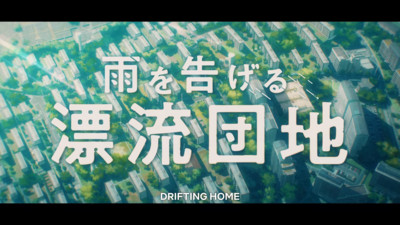
Studio Colorido really have a knack for this kind of story, huh? A couple years back we covered their previous film production, A Whisker Away, and it seems like somebody at their HQ has a thing for dealing with adolescence via on-the-nose visual metaphors.
The same director, Hiroyasu Ishida, also directed Penguin Highway at Studio Colorido. That story was an adaptation and this movie is an original concept by Ishida, but both fit into the mold of magical realism. In recent years, the anime film industry seems to have followed this trend of putting out grounded-yet-fantastical high-pathos spectacles of youth. I consider Studio Colorido to do it better others.

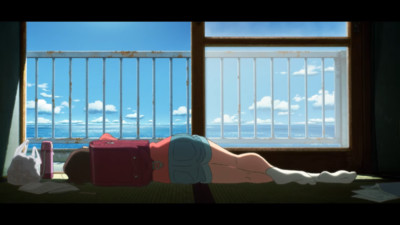
In another bit of synchronicity this marks the second perilous, life-threatening adventure starring children way over their head in crumbling piece of infrastructure to hit Netflix this year. And while this is no Orbital Children, I came away liking it a lot.
I tend to enjoy a classic emotional story even if it's about kids. Watching a kids' film as an adult can be kind of annoying and it takes skill to write child characters who feel complex and genuine. I did not expect this movie to give me vague vibes of Alex Garland's Annihilation, despite one of the characters having a connection to Florida.


This film actually hits close to home in two ways for me. One is that I've also recently undergone an enormous life change that required leaving my long-time home and all the memories therein. The other is having snotty kids come down to where I live now and clog up the roads because they want to see the Michael Mouse museum.

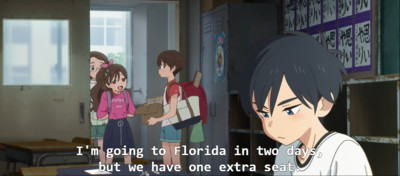
I think a lot of people could potentially connect to Drifting Home, whether they are young or not-so-young. This movie's heart is about the casualties of modern industrialization. Elementary schoolers Kosuke and Natsume struggle with the passing of Kosuke's grandpa and the memories of an about to be condemned apartment complex.
It's also very...blunt, shall we say. Like A Whisker Away wasn't exactly playing coy about what turning into a cat was a metaphor for, it at least didn't whack you over the head with it. Here though, every single element of early set up is loudly paid off with the characters all but holding a big sign saying "this is a visualization of [insert character here]'s internalized grief". Which I guess makes sense since this is aiming for a younger audience, but it did get a little tiresome at points.

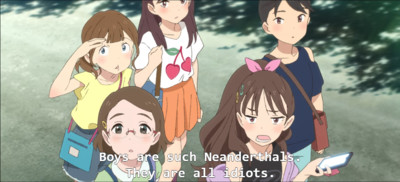
Part of movies is being able to get caught up in the craft too, even when the story is simple on paper. Drifting Home is a very deft and thoughtfully paced film. It knows how to pull its weight to draw you into a moment. The opening sequence of two children running down sweet memory lane when their town wasn't a concrete jungle of construction equipment really shows as much.

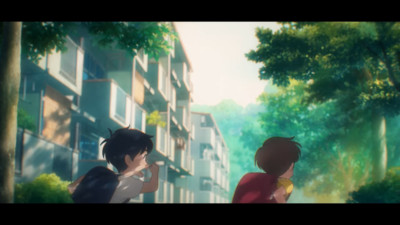
It's a solid setup, and it does definitely put us in the heads of our two main characters. Kosuke and Natsume are both on the precipice of leaving childhood - it's the last summer of elementary school, their families have moved into new apartments, and both are dealing with significant familial issues that have seen their friendship grow very distant. Which makes it extra awkward when Kosuke and his friends find Natsume in a very "Please Don't Tell Anyone How I Live" moment in his old condemned apartment.


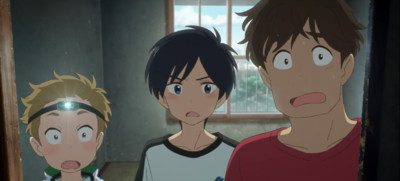
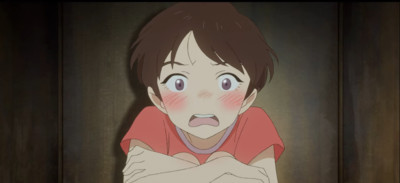
They're also at the age where kids tend to start being a little more aware and dividing themselves into different cliques. So at first, Natsume's distance seems to be a sign of her maturing faster than Kosuke and growing out of their friendship as if he were an old pair of shoes. Natsume tries hard to act coolheaded around others, even acting like an adult towards her mom, but someone who was really as calm as she says she is wouldn't be sleeping in an abandoned building.

A lot of the details around Natsume, particularly her family life, start off pretty vague for this reason.
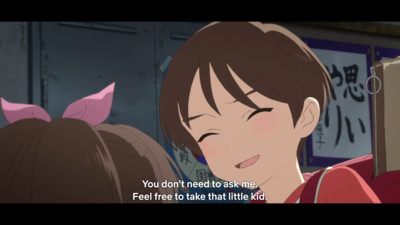
A lot of the details around Natsume, particularly her family life, start off pretty vague for this reason.
At the start all we really know is that she lives alone with her mom, and spent a lot of time being babysat by Kosuke's now-late grandpa while her mom was at work. For his part, Kosuke has a less than chill outlook on that whole deal.


Which, hey, real great thing to start yelling about when your friends are all standing right next to the two of you, twerp. Sure that won't make anything awkward at the jungle gym next week.
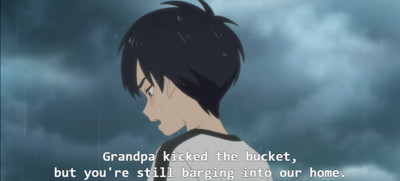
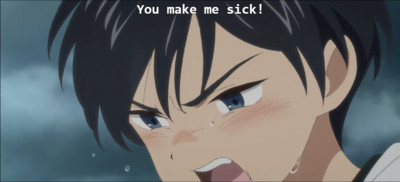
Which, hey, real great thing to start yelling about when your friends are all standing right next to the two of you, twerp. Sure that won't make anything awkward at the jungle gym next week.
Kosuke's words alone make it sound like Natsume was an invasive element on his nostalgic memories of his grandpa, but even just by looking at his texts we know that he really misses her and is mostly just avoiding his feelings because he's a kid. Just like how kids rigorously avoid the foods they don't like.

Note: Even if you are not a kid, if you do not like mushrooms, I will claim them from you.
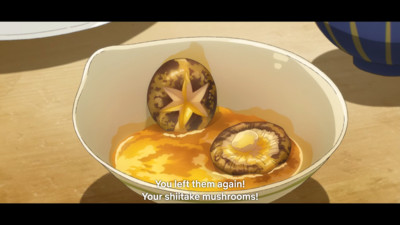
Note: Even if you are not a kid, if you do not like mushrooms, I will claim them from you.
Anyway it turns out the unsecured rooftop of a condemned building isn't a great place to have a fight, and Natsume winds up damn near dropping off the side in the scuffle, because it's a running element of this movie that none of these kids have anything resembling proper balance.

Seriously, get used to that imagery because I'm pretty sure every single child in this falls off a precarious ledge at some point. It's practically an advertisement for inner-ear infection check-ups.
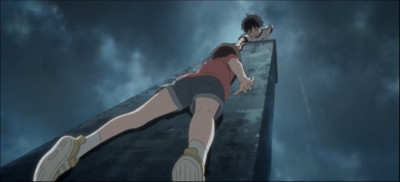
Seriously, get used to that imagery because I'm pretty sure every single child in this falls off a precarious ledge at some point. It's practically an advertisement for inner-ear infection check-ups.
I'm shocked these kids have so much upper body strength, but maybe they're just all really light?
Moving on, just before Natsume falls to her death, a huge storm rolls in and everyone watching is swept off to sea with the entire building.


As in literally the foundation of the building is just floating on a vast ocean. Between the visuals and the multiple mentions of Florida, I wonder if this movie wasn't inspired by encroaching coastal erosion.

Enjoy Orlando while you can, Reina, because that's what it's gonna look like by the time you're an adult.
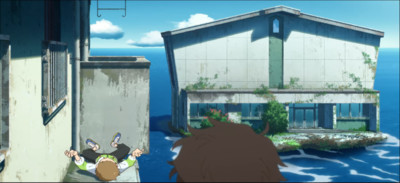
Enjoy Orlando while you can, Reina, because that's what it's gonna look like by the time you're an adult.
The kids are stuck with no food, no water, no phone, and no internet. They can't even download anything on the Switch! So much for using Smash DLC, eh?


They may have no food or hope, but they DO have a ghost! They're in for the world's most intense Scooby Doo mystery ever, zoinks!


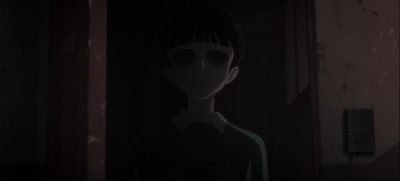
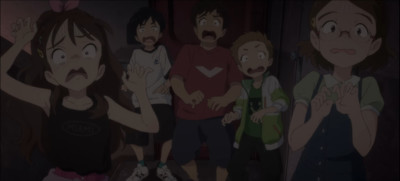
Don't worry he's just a very tall four-year-old.

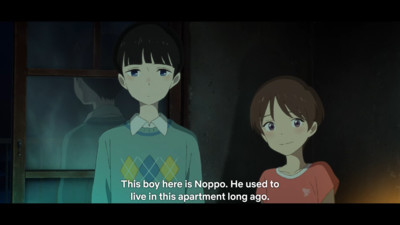
Sure I'll buy that, along with a bridge in Manhattan. That has also mysteriously started drifting along an ethereal sea.


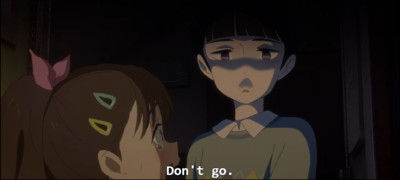

Turns out, Natsume has been in this realm before. She even stocked up on snacks for herself that keep everyone from starving (at least immediately). While Noppo claims that he's always lived here despite Kosuke having never seen him. The way he dresses is particularly weird, like a child who was abandoned and eventually grew too tall.
And for a couple of days they mostly make the best of it like any kids in an adventure movie would. But eventually the realities of being stuck at sea with no resources starts to weigh on the group. Doesn't help that along with their friends, the magic downpour also brought along a girl who fucking hates Natsume's guts.


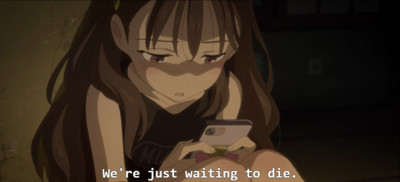
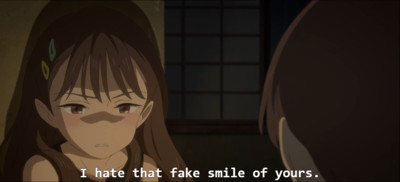
Yeah, Reina basically exists to be the designated conflict starter of the group, as if Kosuke and Natsume's squabble wasn't enough. The kids aren't really sure what to make of their magical situation. Kosuke tries to be practical. Reina initially tries to excuse it as a joke. She also has a baby-crush on Kosuke and wants an excuse to get closer to him, which is why she's jealous of Natsume. It's fortunate that Reina brought her chill friend with her to keep things from getting too out of line and her snobbish brat attitude is usually played for laughs.

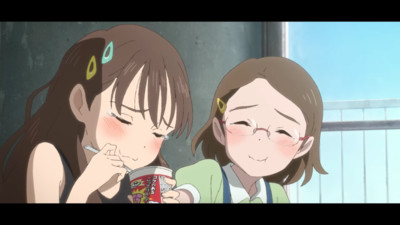
I'll also note that it's the the little gags that keep this film from being an exhausting series of emotions and perils! The side characters, like Kosuke's friends and Reina, really add to that compared to if it was just Kosuke and Natsume floating out there.

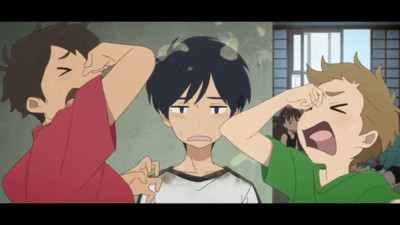
Honestly Taishi and Yuzuru are kind of the MVPs of this whole thing. They don't get any real arcs of their own, but that frees them up to basically keep the rest of these emotionally compromised kids from moping themselves to death.

It's why you always need at least one emotionally stable person in your friend group if you ever get lost at sea. Otherwise you end up like the Essex.
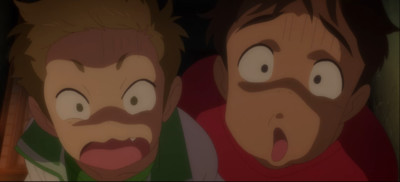
It's why you always need at least one emotionally stable person in your friend group if you ever get lost at sea. Otherwise you end up like the Essex.
They also feel the most kid-like without overplaying their antics or making them feel whiny. While overall this movie isn't super dark for its age group, it gets pretty close. There are some parts in this movie that made ME feel scared and a couple others where I sucked air through my teeth in pain.

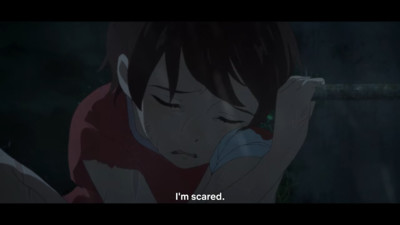
Oh for sure. Like it's not gory, but if you're sensitive to kids in peril then there's a lot of little moments that will make you wince out of your skin. Like Natsume clinging to the side of a crumbling building and gripping onto jagged, rusted rebar.

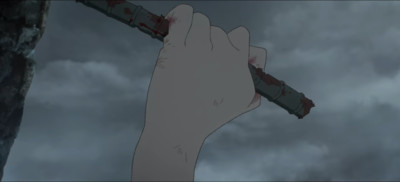
And I thought falling and breaking some glass was bad. Nothing feels more like "hospital" than getting tetanus. Definitely worse than your average scraped knee.
And later on in the movie, it definitely feels like any one of the kids could die. I knew it wouldn't go there because of its demographic, but it cuts it pretty close !
There's also some mild body horror courtesy of Noppo who, surprise, isn't just a weird tall child.


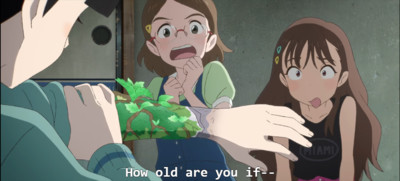
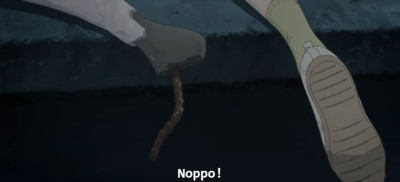
This is why I made the Annihilation comparison, specifically. Empty pools will never be the same, either. Even in daylight, they still creep me out now because of that movie. All this one needs is a horrifying bear creature!

Anyways, Noppo is never literally explained but it seems like he's a literal embodiment of the apartment complex's spirit. At least, that's my interpretation of it.
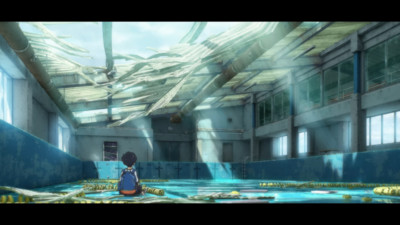
Anyways, Noppo is never literally explained but it seems like he's a literal embodiment of the apartment complex's spirit. At least, that's my interpretation of it.
It reminds me of a song from one of my favorite bands. There, the isolated old building awaiting destruction represents the isolation of abandonment through addiction. Here, Noppo and and the building represent the form of childhood itself for Natsume and Kosuke. The sentiments and emotions and memories and everything else that one can imagine seeping into the wood and concrete of the places we spend so much of our lives. The building's looming destruction, for them, means erasing that childhood, and Natsume is absolutely not ready to do
that.




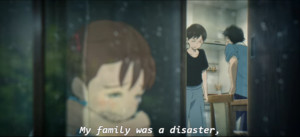
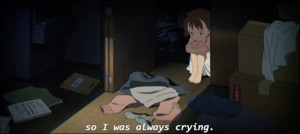
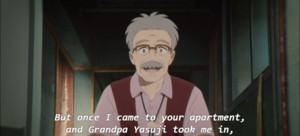
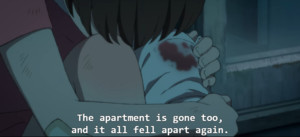
It must feel devastating for Natsume, a kid from a broken family, to have her home-away-from-home for torn down. We understand how much Natsume was struggling to hold everything in and it led her to cling to the only place where she felt like she belonged. This is why she reacted so strongly when Kosuke tries to comfort her by saying that she shouldn't feel bad about someone she's not even blood-related to.


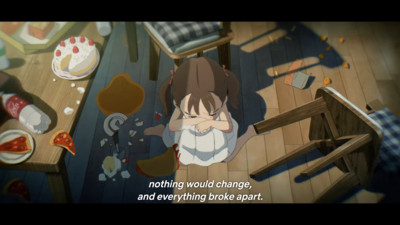
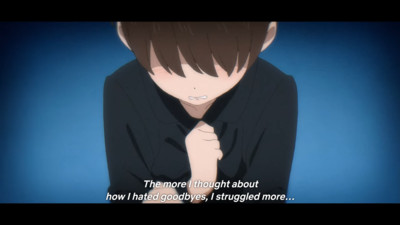
It's a looooooooot and only gets heavier when the building starts to crumble into the ocean and Natsume abandons their life raft to stay with Noppo while it does.

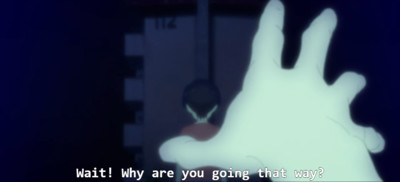
Natsume's feelings are important, but she's also the type who would let herself be literally buried with everything rather than move on with the others, and that's where the movie starts framing Kosuke's more practical personality in a more mature light.

It's also clear that it's not what Noppo wants either. He simply wants these two kids to be happy together again.





It's also clear that it's not what Noppo wants either. He simply wants these two kids to be happy together again.

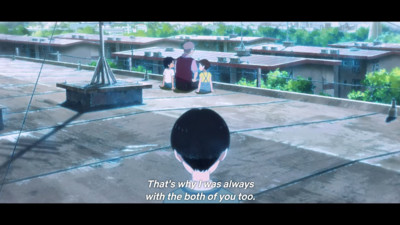
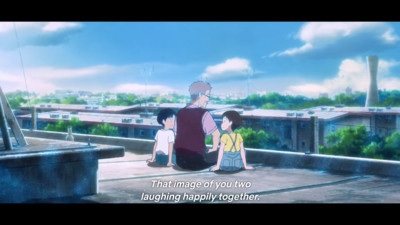
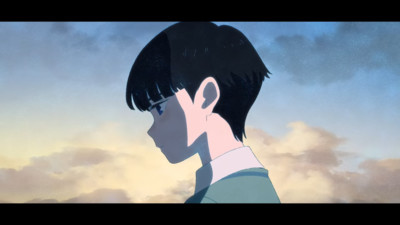
It gets pretty god damn heavy at her lowest moment, too. Especially when she thinks about her mom.


Like I know all this is supposed to be addressed by the end, but maybe get this kid some counselling alongside the magical coming-of-age adventure, too.
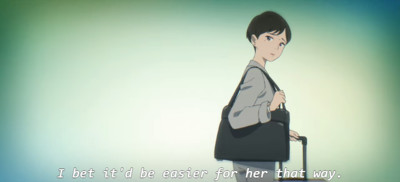
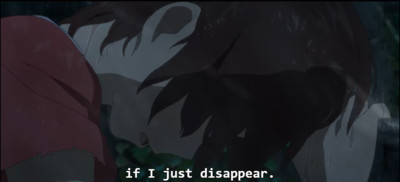
Like I know all this is supposed to be addressed by the end, but maybe get this kid some counselling alongside the magical coming-of-age adventure, too.
Yeah, Natsume accepting support is just the first step. She loved Kosuke's grandpa, her friendship with Kosuke, and his family because they were part of her support when everything became too much for her mom to handle. Once they moved into separate spaces, that support was gone. It's an example of how keeping everyone in their own nuclear blood-families can be really isolating. It's clear that her and Kosuke go beyond childhood friends and are closer to siblings.


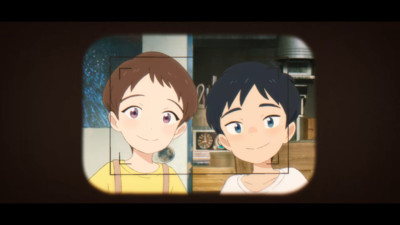
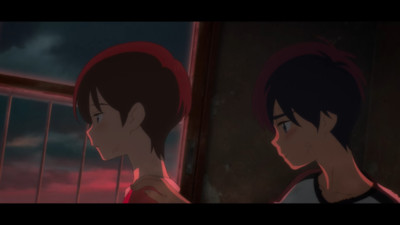
Sometimes being family just means being there for somebody who needed it. Other times it means ziplining off a Ferris Wheel to save them from their own self-loathing.


This is more or less what group therapy is like.
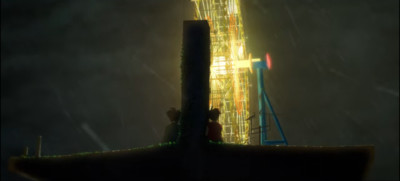
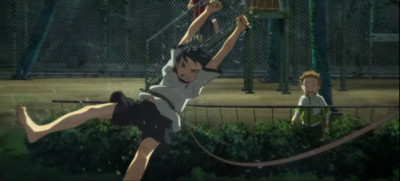
This is more or less what group therapy is like.
Don't try this at home, kids!!
But seriously, if there's one sentiment that hits home with me, its the lesson Natsume ultimately has to learn in all this. After you lose the vast majority of your earthly possessions, it kind of makes you reconsider what any of it meant to you, and quite often the important stuff isn't the physical object but the feelings and memories you associate with it.


Because the fact is, damn near everything with a physical form is impermanent and will crumble to dust with enough time. But that doesn't mean the connections - the family - Natsume made in that apartment can't persevere.




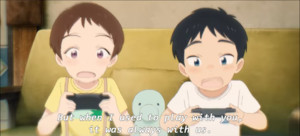
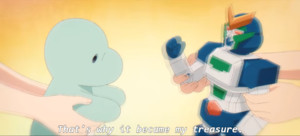
Because the fact is, damn near everything with a physical form is impermanent and will crumble to dust with enough time. But that doesn't mean the connections - the family - Natsume made in that apartment can't persevere.
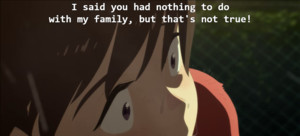
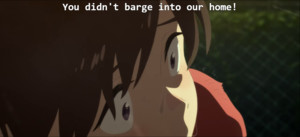
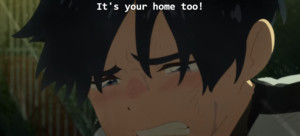
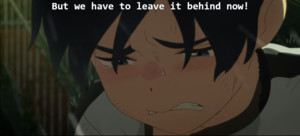
And that's why I stated that this film could be pretty relatable. Even I had to go through a huge childhood move as a kid. Though, renting from place-to-place makes it harder to form the same attachments as an adult. Similarly, there's malls, schools, and theme parks that we sometimes just end up outliving. Things change all the time. Sometimes it's bad reasons, my childhood theme park is about to become real estate, for example. So I can relate when Reina has a heart-to-heart with a literal Ferris Wheel.


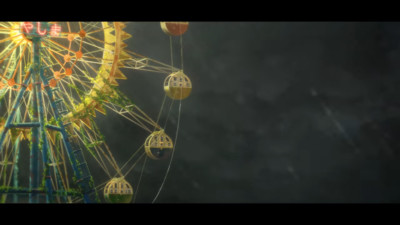
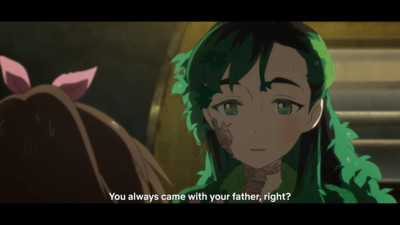
Honestly that's one of the things I wish the movie had been a little more subtle about. Like, maybe just a moment of recognition from Reina before they have to depart from the amusement park. Because as-is it feels like the final act gets bogged down in explaining too much of its own subtext.
But other times, it's just the natural progression of things. I suspect this movie is partially a response to a country that's trying to reinforce its infrastructure. Japan has a ton of old outdated buildings as well as older people. People might catch themselves living in a transitory period and feel unsteady, like a sinking ship. It's an emotional growing pain that you never stop having.
There's also just the broader theme of the passage of time. Things will change in your life, whether it's losing loved ones or changing cities or just moving on from your current stage of life. It's as irreversible and irresistible as the waves of the ocean. The best you can do is try to keep those most important to you close as you row forward, and try to remember what you end up leaving in your wake.

The second best you can do is NOT LEAVE THE VALUABLE ANTIQUE CAMERA YOUR DEAD GRANPA LEFT YOU ON THE EDGE OF THE BALCONY.

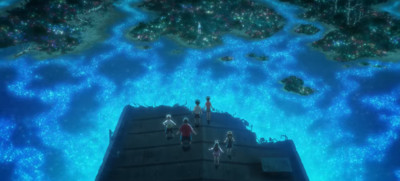
The second best you can do is NOT LEAVE THE VALUABLE ANTIQUE CAMERA YOUR DEAD GRANPA LEFT YOU ON THE EDGE OF THE BALCONY.
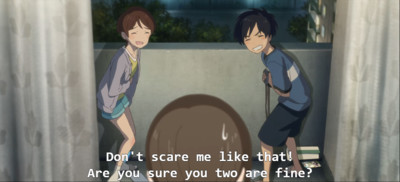
And remember, there's really no place like home!

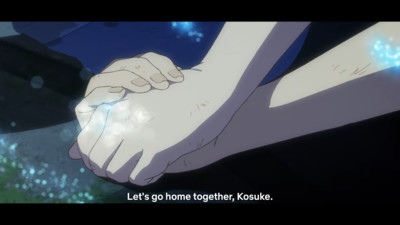
discuss this in the forum (2 posts) |
